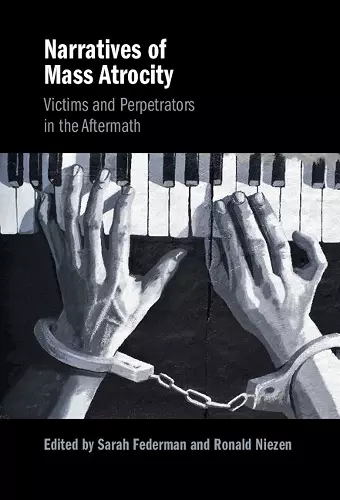Narratives of Mass Atrocity
Victims and Perpetrators in the Aftermath
Ronald Niezen editor Sarah Federman editor
Format:Hardback
Publisher:Cambridge University Press
Published:8th Sep '22
Currently unavailable, and unfortunately no date known when it will be back

Offers a narrative approach to post-conflict intervention, showing how legalism following mass violence encourages dangerous binaries.
This book demonstrates how, in the aftermath of mass violence, legalism can encourage harmful victim-perpetrator binaries. It offers a new approach that illuminates the ambiguities of violence and its moral responsibilities, suggesting new, more effective paths forward. Available Open Access on Cambridge Core.Individuals can assume—and be assigned—multiple roles throughout a conflict: perpetrators can be victims, and vice versa; heroes can be reassessed as complicit and compromised. However, accepting this more accurate representation of the narrativized identities of violence presents a conundrum for accountability and justice mechanisms premised on clear roles. This book considers these complex, sometimes overlapping roles, as people respond to mass violence in various contexts, from international tribunals to NGO-based social movements. Bringing the literature on perpetration in conversation with the more recent field of victim studies, it suggests a new, more effective, and reflexive approach to engagement in post-conflict contexts. Long-term positive peace requires understanding the narrative dynamics within and between groups, demonstrating that the blurring of victim-perpetrator boundaries, and acknowledging their overlapping roles, is a crucial part of peacebuilding processes. This title is also available as Open Access on Cambridge Core.
'We think we have a good understanding of the role narratives of hate, degradation, and demonization play in setting the conditions for mass atrocities and genocidal violence. We know far less about the role narratives continue to play in their aftermath. Roles such as victim, perpetrator, hero, and traitor seem self-evident and fixed. They are not, these authors argue. Yesterday's hero is today's perpetrator, yesterday's perpetrator is sometimes also a victim, and yesterday's perpetrator is tomorrow's hero. Using rich case studies, these chapters deepen our understanding of post-atrocity narrative, by deconstructing the roles of victim and perpetrator, and unsettling the “security of binaries” on which the conception of these roles, our understanding of “what happened”, and our missions in transitional justice, reconciliation, and peacebuilding, all depend. The cost of ignoring the force of post-atrocity narrative is the risk of setting the conditions for the next wave of incitements and violence.' Kevin Avruch, Jimmy and Rosalynn Carter School of Peace and Conflict Resolution, George Mason University
'Federman and Niezen's bold introduction to this volume forces us to confront the bitter reality that discourse, in the aftermath of mass violence, is overrun with brittle, self-serving narratives that deepen harm and complicate the path to healing. A remarkably diverse set of cases illustrates this point and offers evidence of how novel language, non-binary thinking, and innovative technology combine to forge new narrative ecologies where the stories told have a chance of promoting peace. Bravo!' Susan F. Hirsch, Vernon M. and Minnie I. Lynch Chair of Conflict Analysis and Anthropology, George Mason University
'In this remarkable book, the authors help us see the high cost we are paying for oversimplifying conflict and post conflict narratives and highlight the unintended consequences of the binary frameworks we use when looking for justice. What does it take to be able to put the past go and heal from conflict trauma: The restoration of complexity. Read the book to find out how.' Donna Hicks, Associate at the Weatherhead Center for International Affairs, Harvard University
ISBN: 9781009100298
Dimensions: 235mm x 158mm x 26mm
Weight: 700g
278 pages